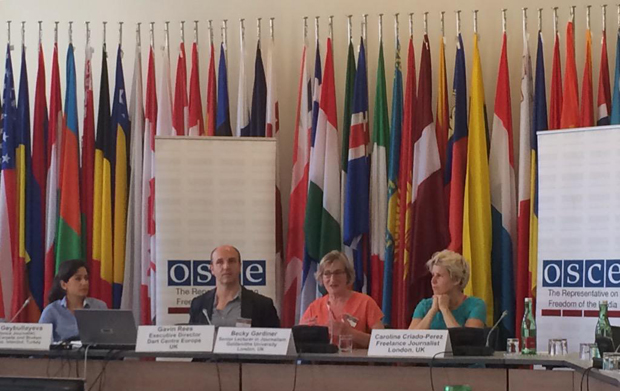28 Mar 2023 | Afghanistan, News and features
In deeply patriarchal and repressive societies like Afghanistan women have always been subjected to gender-based discrimination and violence. This was the case before the Taliban came to power but it has become much worse since – and women, who were already underrepresented in the media industry, are suffering immeasurably.
The dwindling community of female journalists has reached a concerning level. Soon after the Taliban’s coup they started a crackdown on all journalists. There were raids on the houses of journalists, arrests, detentions, intimidation and harassment.
In addition to direct threats, the Taliban started to systematically harass women in the media to make it difficult for them to work. The Taliban introduced strict dress codes, including making the veil mandatory. The ban on long-distance travel of women without a male guardian has made field work for women impossible. Women have also been banned from appearing on TV shows. The Taliban effectively want us to completely disappear from the media landscape.
Due to these barbaric laws many women have lost their jobs and many have fled the country. Those women who were the sole earners in the family are now living in destitution.
The outflux of women with essential skills has created a brain drain in Afghanistan. Years of progress with regards to media development, women empowerment and capacity building of women in media has been undone by the Taliban in merely two years. All the women journalists who toiled for years and built up their skills – despite the difficulties – are now either confined to the home or in exile in miserable situations. Unfortunately some have lost their lives in attempts to seek shelter. A female senior Pashto journalist, Torpekai Amarkhel, drowned with her family in a boat sailing them to Italy just a few weeks ago.
Amarkhel’s asylum case for Australia was in process. But due to the long, arduous, slow and chaotic process of filling and requesting asylum or refugee status in developed countries, journalists in distress are opting for perilous and illegal means of immigration. It’s a response coming from extreme desperation and frustration. Western countries must try to understand this and must make the visa process easy, fast and efficient.
Within Afghanistan, people’s desperation is being exploited for financial gain. Acquiring essential travel documents is being aggravated by long delays, tough requirements and chaotic procedures, which has meant the opening of illegal channels to mint more money from helpless people running for their lives. For example the average fees for a passport right now is at least $3000 and fees for a Pakistani visa is $1200. This makes the legal evacuation from Afghanistan for those journalists at risk almost impossible, forcing them to opt for illegal channels. For those taking this route the outcomes can be awful. In many instances people are arrested and detained in neighbouring countries.
In exile the Afghan journalists are unable to continue their journalistic work due to a myriad of issues, such as lack of opportunities in the countries of temporary residence, language barriers, legal barriers and discrimination against Afghans. The result? Women journalists in exile are either forced to stay at home or they are forced to do menial work to simply make end meets. They’re out of work, gaps in their career growing. Some are now quitting the industry and switching careers.
The situation is stifling for male journalists too. The heart-wrenching stories of Afghan journalists are sadly countless. A journalist who worked alongside me in a media outlet recently posted on Twitter and other social media platforms about selling one of his kidneys to get some money to support himself and his family in exile in Pakistan. Another journalist from Afghanistan trashed all his academic and professional documents out of frustration at his joblessness and inability to get any humanitarian support. And another journalist, a senior one with a strong track record in the industry, has become a cobbler working in the streets.
In order to save the community of journalists in general, and women journalists in particular, the world must act. Western countries must open their doors so that we can access work, education and free speech and expression which we have been denied in our own country. But everyone can help protect Afghan journalists and create opportunities for them within Afghanistan and in exile. Engage with Afghan journalists through fellowships, scholarships, workshops, training and other opportunities to save the media from dying. And finally pressurise the Taliban to reverse their barbaric decisions that have created a gender-based apartheid and is pushing generations of Afghans back to the stone age.
22 Sep 2015 | Austria, mobile, News and features, United Kingdom

Panelists at the OSCE meet on online attacks against journalists: writer Arzu Geybulla; Gavin Rees, Europe director of the Dart Center for journalism and trauma; Becky Gardiner, from Goldsmiths, University of London; journalist Caroline Criado Perez
“This is not something that only ‘ladies’ can fix,” emphasised Dunja Mijatovic, the OSCE’s Representative on Freedom of the Media at an expert meeting on the safety of female journalists in Vienna on 17 September 2015, which Index on Censorship attended.
The importance of collectively tackling the growing problem became an overarching theme of the conference. “There is a new and alarming trend for women journalists and bloggers to be singled out for online harassment,” said Mijatovic, while highlighting the importance of media, state and NGO voices coming together to address the abuse.
Arzu Geybulla and Caroline Criado Perez, journalists from Azerbaijan and the UK respectively, started the meeting with moving testaments of their own experiences. Despite covering very different topics, they have received shockingly similar threats – sexual, violent and personal. “Shut your mouth or I’ll shut it for you and choke you with my dick” was one of the messages received by Perez after she campaigned for a woman to feature on British banknotes.
Although male journalists also receive abuse, women experience a two-fold attack, including the gendered threats. Think tank Demos has estimated that female journalists experience roughly three times as many abusive comments as their male counterparts on Twitter.
The problem, said Perez, was not just the threats but how the women who receive them are then treated. “Women are accused of being mad or attention seeking, which are all ways of delegitimising women’s speech,” she said. “People told me to stop, close my Twitter account, go offline. But why is the solution to shut up?” She added: “This is a societal problem, not an internet problem.”
“Labelling a person, and making that person an object, is particularly common in Azerbaijan,” said Geybulla, an Azeri journalist and Index on Censorship magazine contributor who was labelled a traitor and viciously targeted online after writing for a Turkish-Armenian newspaper. “Our society is not ready to speak out. You can’t go to the police. The police think it must be your fault.”
The intention of the meeting was to highlight the problem, while also proposing courses of actions. Suggestions included calls for more education in digital literacy; more training for police; more support from editors and media organisations, and from male colleagues. There was some disagreement on whether the laws were robust enough as they stand, or needed an update for the internet age.
Becky Gardiner, formerly editor of Guardian’s Comment is Free section, spoke about how her own views on dealing with online abuse had changed, having initially told writers they should develop a thicker skin. “It is not enough to tell people to get tough. Disarming the comments is not a solution either. That genie is out of the bottle.” Gardiner, who is now a lecturer at Goldsmiths, University of London, is working on research into the issue, as commissioned by the Guardian’s new editor, Kath Viner.
It was suggested that small but crucial steps could be taken by media organisations to avoid inflammatory and misleading headlines (which are not written by the journalist, but put them in the firing line) and to be careful of exposing inexperienced writers without preparation or support. Sarah Jeong from Vice’s Motherboard plaform said, in her experience, freelancers often came the most under attack because they don’t have institutional backing.
The OSCE said this will be the first in a series of meetings, with the aim of getting more organisations to take it serious and to produce more concrete courses of action.
Read more about the online abuse of women in the latest issue of Index on Censorship magazine, with a personal account by Gamergate target Brianna Wu and a legal overview by Greg Lukianoff, president of the Foundation for Individual Rights in Education (Fire).
Tweets from OSCE’s #FemJournoSafe conference:
https://twitter.com/julieposetti/status/644456066432937984
1 Jun 2015 | Events, mobile

The winter 2014 issue of Index on Censorship magazine, which featured a special report on the Magna Carta’s past and present influences
Join the Society of Editors, London Press Club, Media Society, Women in Journalism and YouGov for the debate “800 years after the Magna Carta: Do we have a free press?”
Guardian columnist and Media Show presenter Steve Hewlett will chair the panel of Keir Starmer, the former director of public prosecutions and CPS head turned Labour MP; Trevor Kavanagh, the longtime political editor of The Sun who is now the title’s associate editor; YouGov president and BBC election night expert Peter Kellner, and Jodie Ginsberg, Index on Censorship CEO and former Reuters UK bureau chief. The results of a special YouGov poll will be revealed on the night at the debate.
When: Monday July 13, 6.45pm.
Where: Grange Hotel St Paul’s
Tickets can be booked, via a donation to the Journalists’ Charity, here


